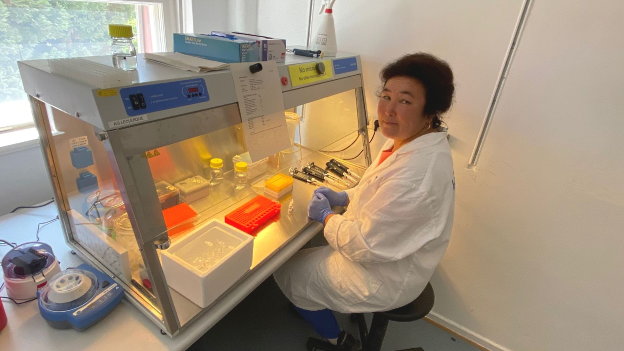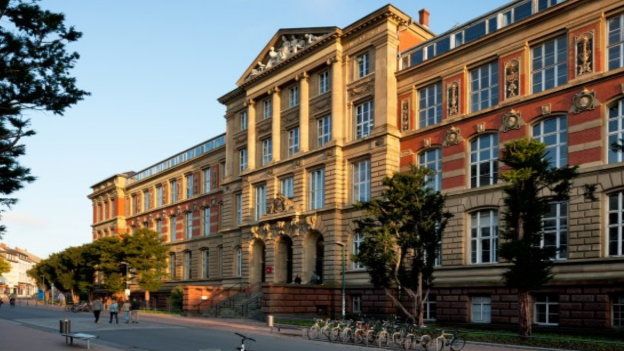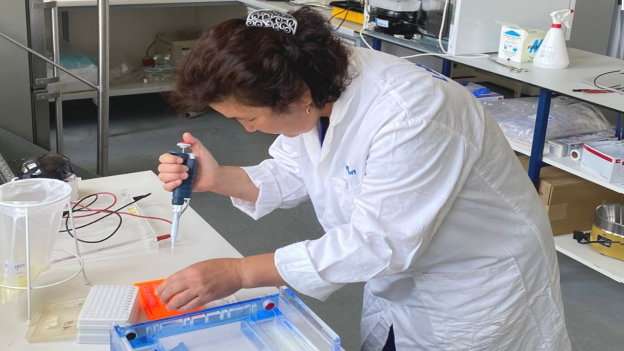Gulmira Sariyeva
 Privat
Privat
Gulmira Sariyeva in the laboratory at the Technical University of Darmstadt
"My thanks go to the DAAD-Stiftung, my Stipendien-Pate (scholarship sponsor) Dr. Ohler, and the scientific adviser Dr. Andreas Leclerque for their kind support of this research. There is no such kind of research at Kyrgyzstan, and I am very interested in promoting this idea towards of biopreparate characterization and publication of valuable research papers."
Prof. Dr. Gulmira Sariyeva came to TU Darmstadt with the "Eurasia Scholarship" to study the spread of the fruit tree pathogen “Erwinia amylovora” and to develop methods to combat it.
In the following, she talks about her results and impressions in Germany:
I did a scientific internship at the Department of Biology, Laboratory for Insect-Associated Microorganisms and Microbial Control of the Technical University of Darmstadt by the Assist. Prof. Dr. Andreas Leclerque from the beginning of July till the end of August. The aim of the research was to identify the bacterial strains that were isolated from the plants of pear and apple trees growing it the Issyk-Kul region of Kyrgyzstan with symptoms of so called “fire blight disease" by molecular-genetic methods.
Bacterial blight is considered one of the most dangerous diseases of fruit crops in the world, causing large losses of crops and death of trees. The causative agent
– bacteria Erwinia amylovora affects, cultivated and wild plants mainly from the rose family.
The pathogen was introduced to Kyrgyzstan in 2008-2009 and after that distributed in all regions. This disease is a main factor of total pear plantations loss in Kyrgyzstan. It should be noted that pear plantations and gardens were really large 20 years ago in Kyrgyzstan and were widely used for export.

Thomas Ott / TU Darmstadt
Old main building of the TU Darmstadt
During my stay at Darmstadt, I was working with the research assistant of the Laboratory for Insect-Associated Microorganisms and Microbial Control, Dr. Haifa Ben Gharsa. She was teaching me how to perform the PCR with different primers and sequencing of DNA amplicons.
The microbiology lab at TU-Darmstadt is very well organized with all streams of waste, non-sterile, and sterile materials. The instructions for work in every department of the lab are well prepared and obligated to be performed. I learned how to organize the lab space with requested streams. Together, we have identified 21 strains of epiphytic and pathogen bacteria by the classical PCR and sequencing of rpoB, infB, atpD and 16sRNA genes, that are the common genes of household of bacteria metabolism.
These strains were isolated in Kyrgyzstan from different objects (apples, pears) and regions (Issyk-Kul and Naryn). This number of strains is quite high for start of microbiological research. As a result, I have got clear identification of 21 strains, among them: Erwinia aphidicola – the pathogen, Pantoae agglomerans – epiphytic bacteria with a very large diapason of stimulating effects on plant health status and soil fertility, Pantoae brenneri – the pathogen of plants, as well as Leclercia and Enterobacter strains.

Privat
In the laboratory of the TU Darmstadt
This finding led me to the further idea to studying the strains of P. agglomerans as a biocontrol agent against pathogenic bacteria like Erwinia amylovora, which is widely spread in the Kyrgyzstan for the last 20 years and had a strong negative effect on the pear trees.
Now I have started to compare the P. agglomerans with E. amylovora to understand what type of interaction is between these two relative bacteria and what is the potential for their use as biocontrol agent against each other. It is very difficult to perform the microbiological and molecular-genetic research in Kyrgyzstan because there are very less experts in this area and there is deficit of materials and equipment for the microbiological and molecular-genetic experiments. It is also difficult to get a financial support for such kind of research, which is quite expensive and needs a lot of investment.
I am very thankful to the DAAD-Stiftung, my Stipendien-Pate (scholarship sponsor) Dr. Ohler and the scientific adviser Dr. Andreas Leclerque for their kind support of this research. There is no such kind of research at Kyrgyzstan, and I am very interested in promoting this idea towards of biopreparate characterization and publication of valuable research papers.
Recently, I got a contact of other microbiologist from the National Academy of Sciences in Bishkek, and we are going to start joint research with her on this topic.
So, the next step will be the design of experiments with Kyrgyz strains of P. agglomerans and E. amylovora to understand how they interact with each other and possibility to use the first specie as a biocontrol agent to the second pathogen specie. I will discuss the matter with Dr. Leclerque because he is a very experienced expert in the area of microbiological and genetically research of pathogens.
The research will be conducted at the molecular-biological laboratory of the Issyk-Kul state university, but I have to find financial support. I made a report on the facebook page of the Issyk-Kul state university and have published some results of research at the International Conference of the Osh Technological University (Kyrgyzstan) in October 2023, and will publish them also in another journal in December.
During my stay in Darmstadt, when I was free from the laboratory research, I started to write the habilitation thesis, and this was a great opportunity to be well concentrated on this work with nice conditions like free Internet, quiet and picturesque nature landscape of the Darmstadt outskirts, with its wheat fields and majestic oak forests. I have prepared first 120 pages of the thesis, and now it is in the process of checking by the research consultant in Bishkek.
The research results got in the TU-Darmstadt were included, also and I hope that they will decorate the thesis because they are new and interesting. I have published 2 research papers with results that were got at the TU-Darmstadt and included them into the final report of research project #68 “Development and testing biological preparate for treatment of fruit trees from the bacterial burn in Kyrgyzstan” funded by the Ministry of Science and Education of Kyrgyz Republic.
So, I tried to use the time in Darmstadt very productively, combining the research activity at the lab, which is very well equipped and organized in term of ergonomics, and walks through picturesque forests and fields around Darmstadt. As a biologist and plant physiologist by background, I was very happy to see again the forests of Germany with oaks and beeches that are more as 200 years old, wild animals like wild geese, roe deer, herons, boars et cetera. I like the lifestyle of German people, with democratic attitude to clothes, regular exercise and walking in the fields and parks, bicycle using, cleanliness and tidiness.
My last stay in Germany was in 2013, and I am very happy to visit this country again with a scientific aim and enjoy its forests, lifestyle, progress in buildings constructions, research, academic areas. I visited again Heidelberg, where I was in 2003, for the first time Wiesbaden, Mainz and very excited about the Rhine River, which is really big and majestic. I reestablished contact with the professor H.K. Lichtenthaler, who was an academic adviser during my first scholarship in TU-Karlsruhe by DAAD in 2001.
I am very happy to know that he is still very active, brave and remembers me. I am going to make future research with Dr. Haifa Ben Gharza, the research scientist of the microbiology lab of Dr. Leclerque on the microorganism interaction. I am very glad that I found the experts in microbiology who can provide the research.
As a conclusion, I would like to say many thanks to Dr. Ohler, Dr. Andreas Leclerque and DAAD-Stiftung for the opportunity to visit Germany again, to learn new molecular-genetic techniques, get interesting results and so positive emotions from my stay in Darmstadt!
As of November 2023.


